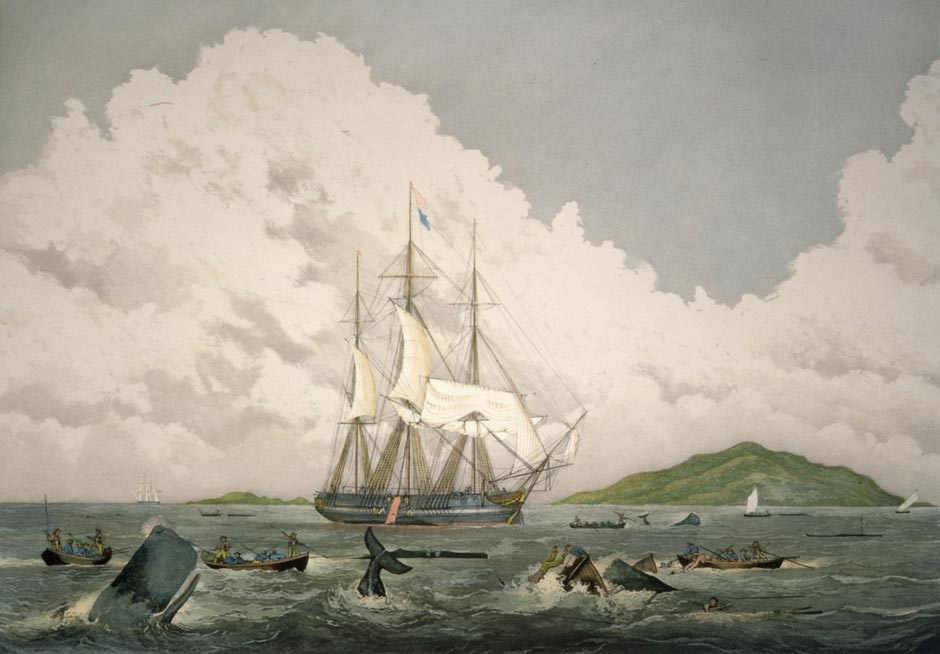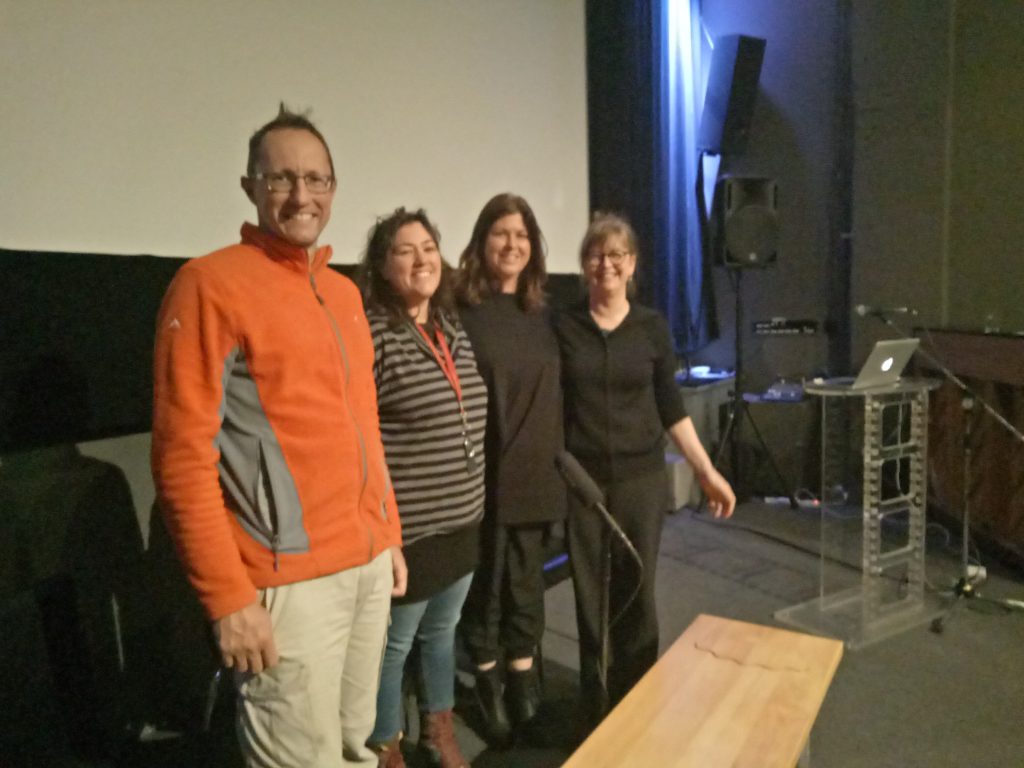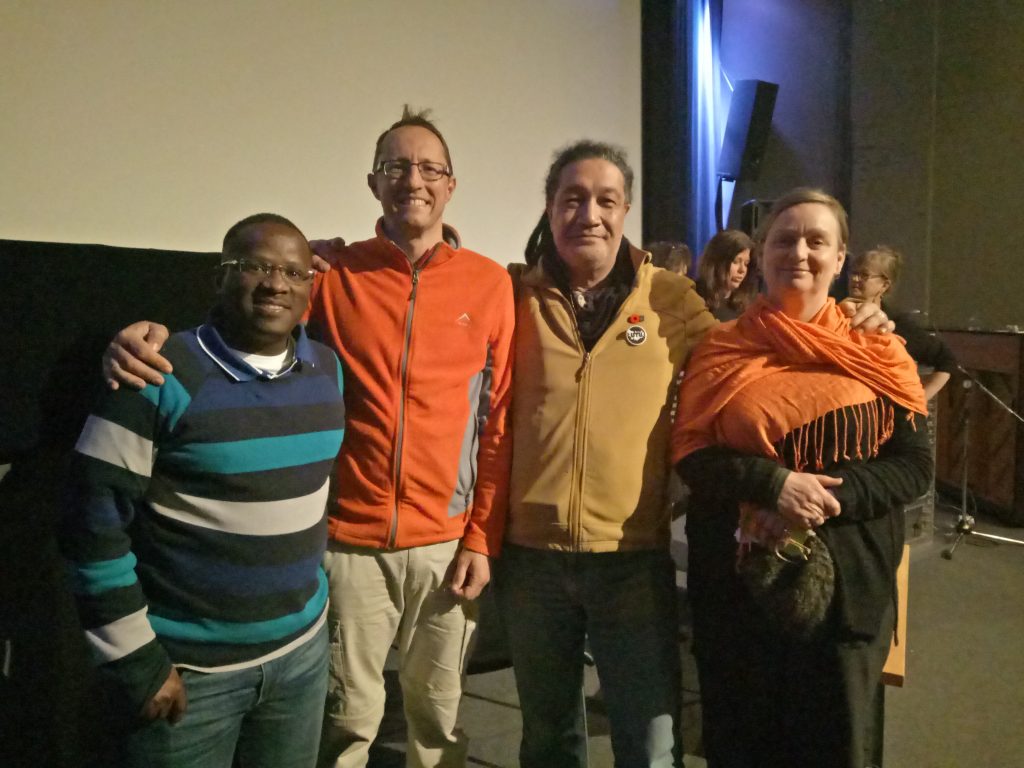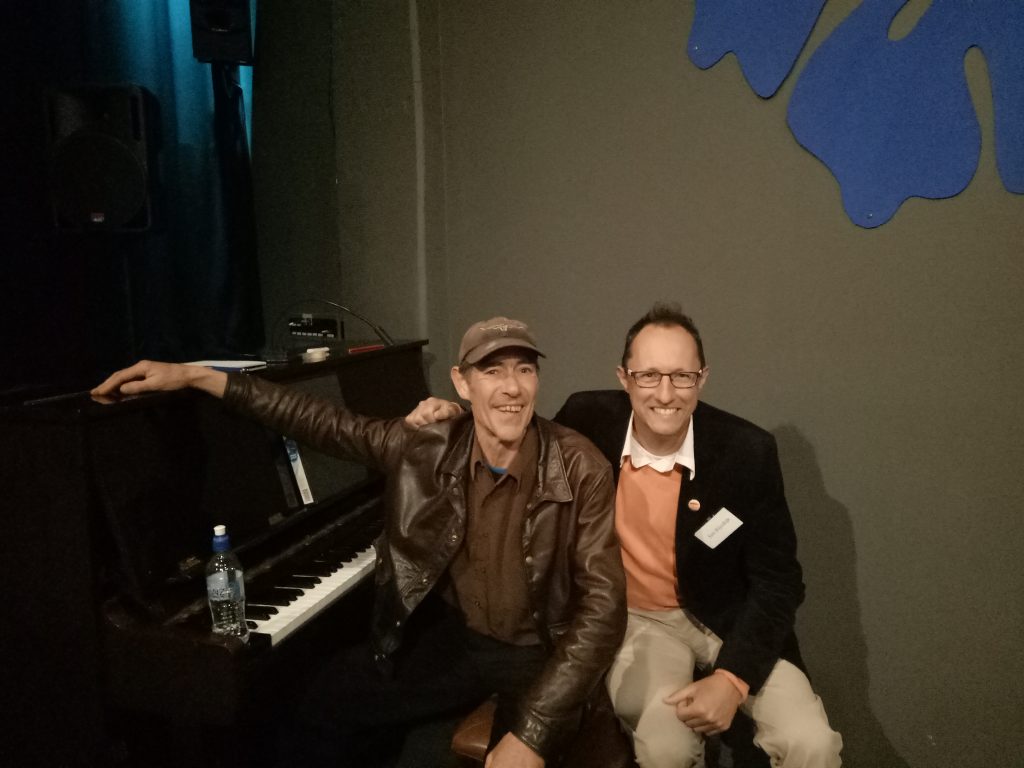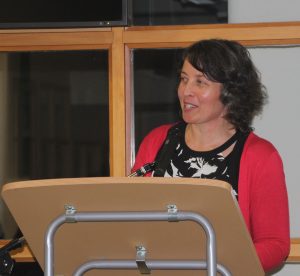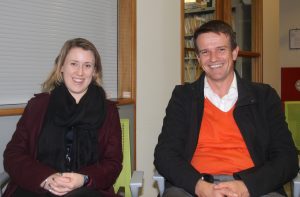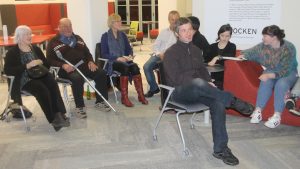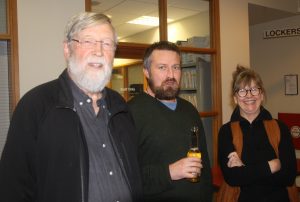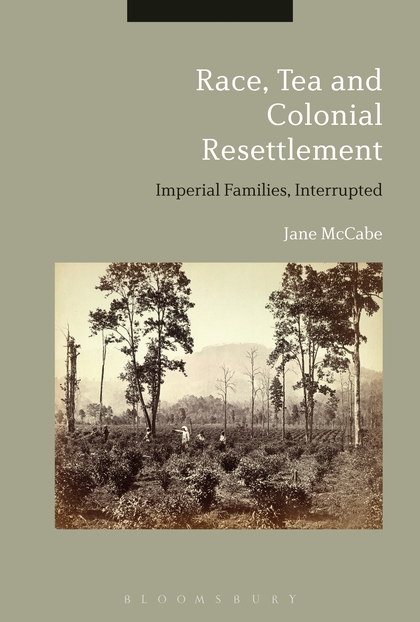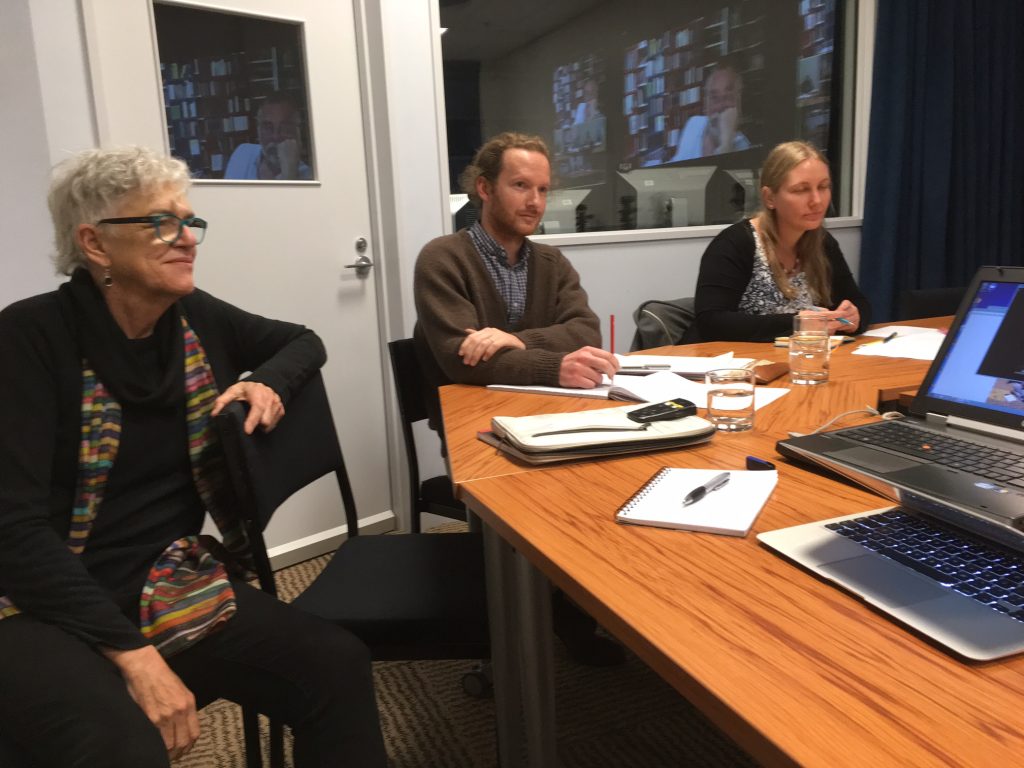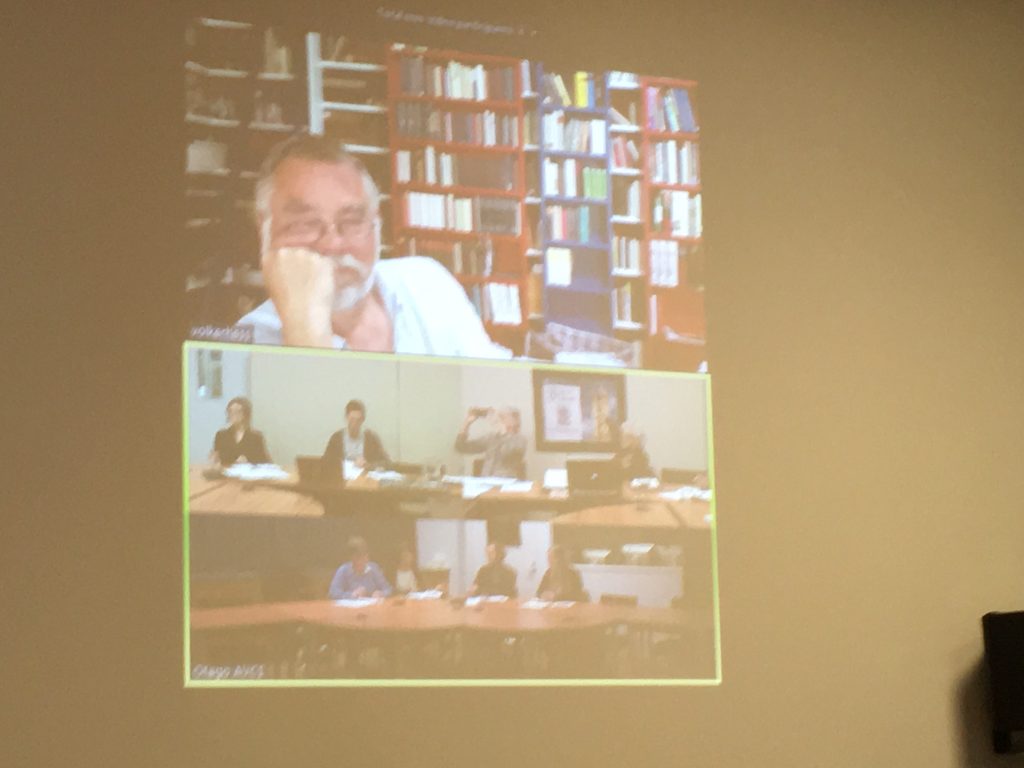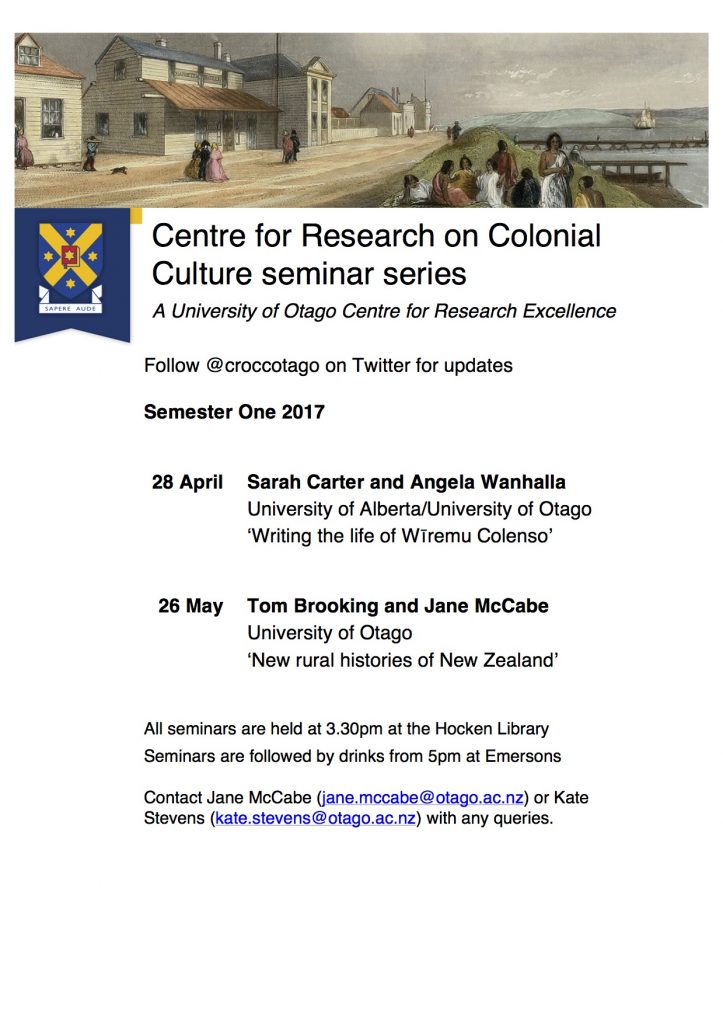New Histories of Pacific Whaling Symposium
Call for Papers
New Histories of Pacific Whaling
An International Symposium co-sponsored by the Rachel Carson Center, the University of Oregon and the Centre for Research on Colonial Culture, University of Otago, New Zealand
University of Hawai’i – Mānoa, June 29 – 30, 2018
Emerging historical scholarship is upending older work on whaling and showcasing it as an ideal medium with which to investigate human relationships with the oceans and with each other. Whales offer investigative bridgeheads into the cultural histories of non-human species, the hidden histories of energy economies, and the complicated histories of cross-cultural contact. Whale histories are demonstrating to environmental historians the various scales, including oceanic scales, with which they can work and are challenging them to consider new forms of evidence and new tools of interpretation. This international symposium aims to bring together the excellent, scholarship integrating the history of Pacific whaling with environmental and cross-cultural history. We seek participants from around the world to convene next year at Honolulu, the center of the Pacific whaling industry. We especially welcome scholarship that engages Pacific and environmental history and examines the crucial linkages between whaling, animal histories, indigenous histories, capitalism, diplomacy, environmental change, and globalization.
Participants will be expected to pre-circulate drafts of works in progress in advance of the symposium. Selected papers will be published as a special issue of Rachel Carson Center’s Perspectives. Travel and lodging costs will be covered by the seminar sponsors.
For those interested, please email 250-word paper proposals along with a short cv to the symposium conveners by September 1, 2017
Ryan Tucker Jones, University of Oregon rtj@uoregon.edu
Angela Wanhalla, University of Otago angela.wanhalla@otago.ac.nz
Research Seminar by Dr Mere Whaanga
Film in the Colony
The Film in the Colony Symposium, held at Ngā Taonga Sound and Vision, Wellington, 13-14 July, produced some great discussions and a fine array of films in the face of some wild Wellington weather. The symposium focused on the convergence of film, film-making, the emergence of nation and interactions between peoples in colonial contexts, with an emphasis on New Zealand, South Africa and Australia. The symposium opened with two screenings on Wednesday night: Edward Curtis’s In the Land of the Headhunters (1914; Aaron Glass who was involved in the restoration of this film provided us with a commentary in the form of a recorded powerpoint), and Charles Chauvel’s Jedda (1955), introduced by Tasha James from the Australian National Film and Sound Archive.
The opening keynote speaker on Thursday, Ian-Malcolm Rijsdijk, began with a fabulous map, charting the world as it was filmed in Southern California, and, pointing out where ‘beginning with the question of how film ‘takes place’ in particular locations, moved to a wide-ranging discussion of cinema and decolonisation in South Africa, particularly in the light of the unrest currently dominating South African campuses. How do we make the archive of colonial film valuable to students trying to move away from colonial thinking? How to make it meaningful, and to find a language for discussing it? His point that colonialism is a structure, not an event, was one many found compelling.
From here the focus switched to New Zealand’s early cinema, with Minette Hillyer’s rich account of the visit of ‘Paramount’s Red Indians’ to Rotorua in 1927, and Mark Derby’s discussion of Gaston Melies’ film-making enterprise in the South Seas in 1912, which set us up well for a documentary on Melies’ tour of the Pacific and South East Asia. Alex Porter charted a journey in the other direction, with Len Lye’s departure from New Zealand to London via Samoa, a trip which resulted in his remarkable Tusalava of 1929 – which we then had the privilege of viewing.
Three papers with very different takes on Rudall Hayward’s silent The Te Kooti Trail of 1927 followed: Jani K Wilson compared two of the film’s Ngāti Awa audiences, the second including members of her own hapū; Brendan Sheridan discussed kūpapa in New Zealand Wars films; and Annabel Cooper investigated some of the film’s imagined and real communities. These papers were followed by a screening of the film brilliantly accompanied by pianist Nikau Palm – a treat followed by dinner at Siem Reap.
Friday began with a panel discussion which brought together Honiana Love (Te Ātiawa) and Lawrence Wharerau (Ngāpuhi) from Ngā Taonga with Natalie Robertson (Ngāti Porou), who combined discussion of the evolving relationships between whānau, films and archives, with commentaries on a sequence of films. Natalie, whose whānau appear in the film, talked us through James McDonald’s Scenes of Maori Life on the East Coast, enriching the film with her information about who the people are and where, the significance of their filmed work, and the signs that they were performing their customary labour for the camera, rather than simply going about daily activities. As we watched the Ahipara Women’s Fire Brigade rally to community defence, and fertiliser spreading on Te Puea’s Farm, Honiana and Lawrence discussed the archival detective work of finding out about films and the relationships developing between the archive and communities.
The session on sound brought together Mel Cross’s illustration of how Alfred Hill’s score affords a specific Maoriland resonance to Hayward’s Rewi’s Last Stand (1940); Allison Craven and Ben Palmer’s investigation of the voices of Aboriginal people in Charles Chauvel’s Uncivilised (1936); and – in a return to Rotorua – Aleisha Ward’s account of the contentious production of the first jazz film made in New Zealand, (a publicity film for Epi Shalfoon and the Melody Boys).
Megan Tamati-Quennell gave us an introduction to Lisa Reihana’s Native Portraits N.19897, which had screened through the symposium, and was followed by Felicity Barnes’s elegant revival of a neglected genre, the trade film in Australia and New Zealand. Offered a sample (Captured Sunshine), we wondered with 21st-century amazement at their bygone popularity.
Litheko Modisane closed with an analysis of the career of South African actor Ken Gampu, whose career spanned the apartheid and post-apartheid eras. Gathering up some of the larger themes of the symposium, Litheko asked how audiences could now view Gampu’s earlier work – how can a decolonising society appreciate the colonial legacy, and what vocabulary is there for analysing it. Litheko’s analysis of the complexities of Gampu’s role in Dingaka (1964) was followed by a closing panel and then screenings of Dingaka and Rewi’s Last Stand.
CRoCC would like to extend warm thanks to those who helped organise the symposium: Diane Pivac, Honiana Love and Lawrence Wharerau (Ngā Taonga), Minette Hillyer and Jo Smith (Victoria University of Wellington), Sue Lang, Helen O’Sullivan and Bronwyn Craig (University of Otago).
Annabel Cooper
CfP: New Histories of Pacific Whaling
Call for Papers
New Histories of Pacific Whaling
An International Symposium co-sponsored by the Rachel Carson Center, the University of Oregon and the Centre for Research on Colonial Culture, University of Otago, New Zealand
University of Hawai’i – Mānoa, June 29 – 30, 2018
Emerging historical scholarship is upending older work on whaling and showcasing it as an ideal medium with which to investigate human relationships with the oceans and with each other. Whales offer investigative bridgeheads into the cultural histories of non-human species, the hidden histories of energy economies, and the complicated histories of cross-cultural contact. Whale histories are demonstrating to environmental historians the various scales, including oceanic scales, with which they can work and are challenging them to consider new forms of evidence and new tools of interpretation. This international symposium aims to bring together the excellent, scholarship integrating the history of Pacific whaling with environmental and cross-cultural history. We seek participants from around the world to convene next year at Honolulu, the center of the Pacific whaling industry. We especially welcome scholarship that engages Pacific and environmental history and examines the crucial linkages between whaling, animal histories, indigenous histories, capitalism, diplomacy, environmental change, and globalization.
Participants will be expected to pre-circulate drafts of works in progress in advance of the symposium. Selected papers will be published as a special issue of Rachel Carson Center’s Perspectives. Travel and lodging costs will be covered by the seminar sponsors.
For those interested, please email 250-word paper proposals along with a short cv to the symposium conveners by September 1, 2017
Ryan Tucker Jones, University of Oregon rtj@uoregon.edu
Angela Wanhalla, University of Otago, angela.wanhalla@otago.ac.nz
Jane McCabe’s new book on Indian migrants
Last Thursday saw the successful launch of Jane McCabe’s new book, Race, Tea and Colonial Resettlement: Imperial Families, Interrupted at the Hocken Collections. Launched by Centre Co-director, Angela Wanhalla, this monograph (published by Bloomsbury) explores the experiences of the “Kalimpong Kids”, mixed-race children of tea planters in India, from their missionary-run boarding school, to their migration to New Zealand. Jane is descended of one of the children, and a number of other descendants came to the launch.
Jane, who works in the Department of History and Art History is a keen member of the Centre for Research on Colonial Culture. A Marsden Grant recipient, she is now researching land and inheritance in Aotearoa New Zealand.
Film in the Colony: Registration Closing 5 July
For those interested in attending the Film in the Colony Symposium being held at Ngā Taonga Sound & Vision (13-14 July) in conjunction with a screening programme on 12 & 15 July, be advised that registration is closing soon, so get in quick as there are limited places.
Forthcoming Conferences: Law, History, Film
A number of associations have released CfPs in the past month, including the New Zealand Historical Association, the Australian and New Zealand Law and History Society (ANZLHS), plus the Law and Society Association of Australia and New Zealand (LSAANZ).
From 28 November to 1 December, the Biennial New Zealand Historical Association Conference will be held at the University of Auckland on the theme: Tāmaki Herenga Waka: Where Histories Meet, celebrating Auckland as a meeting place of people, of culture and of ideas from throughout New Zealand and across the world. The Call for Papers and details about the keynote speakers can be found on the conference website. Do note that the submission deadline for abstracts is 28 July.
The University of Otago’s Legal Issues Centre is co-hosting LSAANZ this year in association with Te Pokapū Take Ture and Ngā Pae o te Māramatanga. The Call for Papers closes on 14 July and the conference will take place from 6-9 December in Dunedin.
A few days later the ANZLHS Conference will take place at the University of Canterbury, Christchurch on 14-16 December. The conference theme is: “Legal and social change – gradual evolution or punctuated equilibrium?” This conference theme draws on evolutionary theory about how species form, and asks whether changes in the law and in the effects of particular laws on society occur through a gradual process of incremental change or through periods of relative stasis with intervening major shifts.
Inquiries or submissions of papers should be accompanied by a brief abstract and biography and sent to the programme co-ordinator, Professor Jeremy Finn jeremy.finn@canterbury.ac.nz by 21 August. Keynote speakers for the conference include Professors Charlotte McDonald (Victoria University of Wellington); Kjell Modeer (Lund University), and Amanda Nettelbeck (University of Adelaide) and Dr Te Maire Tau (Ngāi Tahu Research Centre, University of Canterbury).
CRoCC is also running a symposium on colonial film in association with Ngā Taonga, Wellington, from 13-14 July.
Archival Files and Knowledge Production Workshop
The Centre hosted a very successful workshop on May 30 & 31, organised by Barbara Brookes, addressing the creation of archival files, the way individual lives get written into such files, the serendipity (or otherwise) of the survival of such paperwork, how it gets ordered, and how such files might make it possible to create claims on the state. Participants also considered the origins of files in book-keeping work and their ongoing life in the digital realm and asked how different forms of accessibility might alter our engagement with files and what might be lost when the original ordering becomes subservient to digital imperatives, such as the great demand by genealogists.
The writing of history is shaped by its sources. Workshop participants spent two days thinking about how those sources shape narratives within institutions, at the national level, and for the individual. Jane McCabe, from the Department of History and Art History at Otago, linked an institution, a number of countries and personal narratives in her paper which is based on an archive that continues to shape lives in the present. Rosi Crane, an Honorary Research Fellow at Otago Museum and a graduate of the Department of History and Art History at Otago, who has been working on the project for Barbara, attended and presented her thoughts near the end of the workshop.
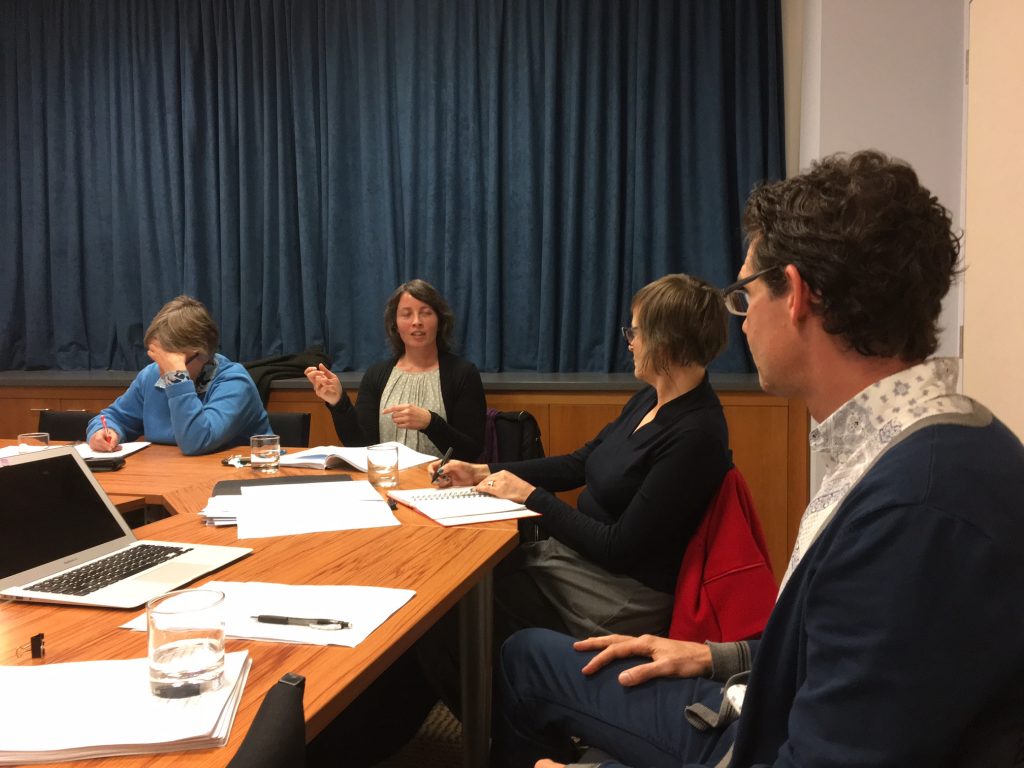
Rosi Crane takes notes as Jane McCabe discusses her paper while Kate Hunter and James Moran listen attentively.
All workshop participants considered this on-going relationship with archives, how historians use them to create coherent stories and how paper trails both serve to highlight some kinds of knowledge and elide others. The Centre was delighted to welcome to the Otago campus James Dunk from the University of Sydney, James Moran from the University of Prince Edward Island, Sally Swartz from the University of Capetown, Kate Hunter and Rebecca Lenihan (with Charlotte Macdonald there in spirit) from Victoria University of Wellington. and Volker Hess, from the Charité – Universitätsmedizin Berlin, who joined the workshop by zoom for three hours of intense discussion of pre-circulated papers.
Congratulations to Barbara Brookes on putting together a fantastic programme of speakers. We look forward to seeing the publication of these papers in a special journal issue in the near future.
Register for Film in the Colony
Registration is now open for the Film in the Colony Symposium, which will be held at Ngā Taonga Sound & Vision, Wellington, on 13 & 14 July.
Full Registration: $100 (General) $85 (Student)
Daily Registration: $70 (General) $55 (Student)
Conference Dinner: $45
Please be aware because of room capacity, registration is limited to 90 people.
You can register via the Film in the Colony website.
New Rural Histories of New Zealand
Prof. Tom Brooking and Dr. Jane McCabe will present at the next CRoCC research seminar on Friday 26 May on aspects of New Zealand’s rural history.
In early June, Tom and Jane will present at the annual meeting of the Agricultural History Society on the theme “Who is a farmer? Regional identity and rural culture”.
They will present their papers at Friday’s seminar in preparation for the Agricultural History Society Conference. They are very keen to get feedback on their presentations.
Their talks will take place in the Hocken Seminar Room on Friday May 26th starting at 3.30. Coffee, tea and snacks will be provided, and all are invited to come for social drinks at Emerson’s afterwards.
All are welcome!

